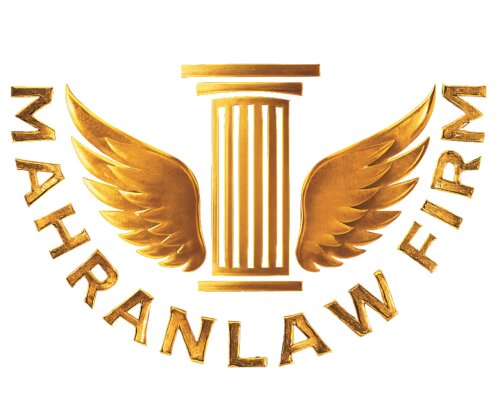Best Job Discrimination Lawyers in Agouza
Share your needs with us, get contacted by law firms.
Free. Takes 2 min.
List of the best lawyers in Agouza, Egypt
About Job Discrimination Law in Agouza, Egypt
Job discrimination refers to unfair treatment in recruitment, hiring, promotion, pay, training, assignment, termination, or any other condition of employment based on characteristics such as sex, religion, race, disability, political opinion, pregnancy, age, or membership in a protected group. In Agouza - a district within Giza governorate adjacent to greater Cairo - employees and job applicants are protected by national legal frameworks that prohibit certain kinds of discrimination and provide routes for redress. Protections come from the Egyptian Constitution, labor laws and regulations, specific statutes addressing disability and harassment, and criminal law where conduct amounts to an offense. Practical enforcement typically involves workplace procedures, local labor offices, labor courts or administrative channels and, for criminal conduct, the public prosecution.
Why You May Need a Lawyer
Discrimination claims often involve multiple legal and practical issues. You may need a lawyer when:
- You have been dismissed, demoted or denied employment for reasons you believe are discriminatory.
- You face persistent harassment at work related to a protected characteristic and your employer has not taken effective action.
- Your employer refuses to provide reasonable accommodation for a disability, pregnancy or medical condition.
- You want to file a formal complaint but are unsure of the correct procedure, deadlines and what evidence is needed.
- You are a public sector employee and must bring an administrative claim rather than a regular labor suit.
- You need to obtain interim relief such as a temporary return to work or an emergency injunction.
- The case involves criminal elements such as sexual harassment, threats, or physical assault that should be referred to prosecutors.
- You are negotiating a settlement, severance or compensation and want to evaluate whether the offer is fair.
A lawyer helps evaluate the strength of your case, gathers and preserves evidence, prepares and files claims, represents you in negotiations or court, and explains remedies and likely outcomes.
Local Laws Overview
The legal framework relevant to workplace discrimination in Agouza is national in scope. Key points to understand include:
- Constitutional guarantees: The Egyptian Constitution provides for equality before the law and non-discrimination. These broad principles support claims of unfair treatment based on protected characteristics.
- Labor law framework: Egyptian labor law regulates employment relationships in the private sector and sets standards on hiring, wages, dismissal and workplace safety. It also establishes procedures for resolving labor disputes, including conciliation and labor courts.
- Public sector rules: Public employees are typically governed by administrative and civil service rules that differ from private sector labor procedures. Complaints by public employees may need to proceed through administrative channels and specialized courts.
- Disability and reasonable accommodation: There are laws and policies addressing the rights of persons with disabilities to access employment and receive workplace accommodations. Employers may be required to make adjustments when reasonable and feasible.
- Sexual harassment and criminal law: Conduct amounting to sexual harassment, assault, or threats can fall under criminal statutes. Recent reforms and specific laws have strengthened criminal penalties and procedures for harassment cases.
- Remedies and enforcement: Remedies for unlawful discrimination can include reinstatement, back pay, compensation for material and moral damages, administrative penalties on employers and criminal prosecution where applicable. Enforcement commonly involves filing complaints with the local labor office, pursuing claims before labor tribunals or courts, and in some cases, bringing matters to public prosecutors.
- Deadlines and procedures: Time limits apply for filing labor-related claims and criminal complaints. These limitation periods can be short. Early action is important to preserve rights and evidence.
Frequently Asked Questions
What counts as unlawful job discrimination in Agouza?
Unlawful discrimination generally means any adverse employment action based on a protected attribute rather than legitimate job-related reasons. Common examples include refusing to hire someone because of their religion, firing a woman because she is pregnant, denying promotion because of trade union activity, or failing to provide reasonable accommodation for a disability. Each situation needs assessment against national law and workplace policies.
Can I file a complaint if I work for a private company in Agouza?
Yes. Private sector employees can typically file complaints with the local labor office under the Ministry of Manpower and pursue labor claims before the competent labor tribunal or court if conciliation fails. A lawyer can help choose the correct procedural path and prepare the necessary documents.
What should I do first if I believe I am being discriminated against at work?
Document the incidents carefully - dates, times, persons involved, what was said or done, any witnesses, and copies of relevant documents such as contracts, emails, messages and performance reports. Report the issue through any internal grievance or human resources process. If internal steps do not resolve the issue, contact the local labor office or a lawyer to evaluate filing an official complaint.
Are public sector employees treated differently?
Yes. Public sector and civil service employees usually follow administrative rules and may have to use administrative complaint procedures or specialized courts instead of ordinary labor courts. Deadlines and remedies may differ. Legal advice is particularly important for public employees.
Can I get my job back if I was dismissed because of discrimination?
Reinstatement is a possible remedy in labor disputes where dismissal is found unlawful, though not guaranteed. Courts or tribunals may order reinstatement and payment of back wages, or alternatively award compensation. The outcome depends on the facts, the employer, and the legal route taken.
What evidence is useful in a discrimination claim?
Useful evidence includes written communications, employment contracts, pay records, performance reviews, witness statements, CCTV if available, medical reports, and records of internal complaints. A lawyer can advise on preserving and presenting evidence effectively.
Is harassment the same as discrimination?
Harassment can be a form of discrimination when it targets a protected characteristic. Harassment that creates a hostile work environment or involves sexual harassment may give rise to both labor remedies and criminal charges. Report harassment promptly and seek legal help to decide whether to pursue civil, administrative, or criminal action.
How long do I have to file a complaint?
Time limits vary by the type of claim and whether the respondent is a private or public employer. Some labor claims have relatively short limitation periods. Because of this, you should act quickly to avoid losing legal rights. A lawyer can clarify the specific deadlines for your situation.
Can a lawyer help me get interim relief, such as returning to work while my case is pending?
Yes. In some cases you can seek provisional measures or urgent remedies to protect your employment rights while the main claim proceeds. The availability and form of interim relief depend on the legal forum and the facts. A lawyer can guide you on the likelihood and procedure for requesting such relief.
Are there local organizations that can help with discrimination or harassment?
Yes. Trade unions, professional associations, civil society organizations and legal aid clinics often provide advice, support and sometimes representation. Governmental bodies such as the Ministry of Manpower and institutions addressing human rights and women s issues can also assist. For criminal matters, victims should contact the public prosecution and police.
Additional Resources
- Ministry of Manpower and Immigration - local labor offices handle employment complaints, conciliation and labor records.
- Local labor tribunals and courts - forums that hear employment disputes.
- Public Prosecution and police - for criminal complaints including sexual harassment, threats or assault.
- Egyptian Bar Association and local lawyers - for legal representation and advice.
- Trade unions and professional associations - for workplace support, collective bargaining and complaints.
- National Council for Women and human rights organizations - for guidance on gender-based discrimination and support services.
- Disabled persons rights bodies and relevant government agencies - for assistance with reasonable accommodation and accessibility issues.
- Local nonprofit organizations and legal aid clinics - which may offer free or low-cost legal advice and support in discrimination and labor matters.
Next Steps
Follow these practical steps if you need legal assistance in Agouza:
- Preserve evidence - save emails, messages, documents, pay slips, contracts and record incidents with dates and witness names.
- Use internal procedures - file an internal grievance if your employer has a clear complaint process, and keep copies of all correspondence.
- Contact the local labor office - request information on conciliation services and official complaint procedures for your area.
- Seek legal advice early - consult an employment lawyer or legal aid provider to assess your case, clarify deadlines and explain likely outcomes.
- Consider alternative dispute resolution - mediation or conciliation can be faster and less costly than full litigation.
- Prepare for different routes - if you work in the public sector, be ready to follow administrative procedures; if the conduct is criminal, consider filing a report with prosecution or police.
- Ask about costs and fees - clarify lawyer fees, possible court fees and the availability of pro bono or subsidized legal help.
- Be mindful of confidentiality and retaliation - discuss with your lawyer how to protect yourself from retaliation and preserve confidentiality where appropriate.
- Keep a clear record of all steps taken and follow your lawyer s guidance on next actions and expectations.
If you are unsure where to start, contact a local employment lawyer or legal aid organization and bring your documentation for an initial assessment.
Lawzana helps you find the best lawyers and law firms in Agouza through a curated and pre-screened list of qualified legal professionals. Our platform offers rankings and detailed profiles of attorneys and law firms, allowing you to compare based on practice areas, including Job Discrimination, experience, and client feedback.
Each profile includes a description of the firm's areas of practice, client reviews, team members and partners, year of establishment, spoken languages, office locations, contact information, social media presence, and any published articles or resources. Most firms on our platform speak English and are experienced in both local and international legal matters.
Get a quote from top-rated law firms in Agouza, Egypt — quickly, securely, and without unnecessary hassle.
Disclaimer:
The information provided on this page is for general informational purposes only and does not constitute legal advice. While we strive to ensure the accuracy and relevance of the content, legal information may change over time, and interpretations of the law can vary. You should always consult with a qualified legal professional for advice specific to your situation.
We disclaim all liability for actions taken or not taken based on the content of this page. If you believe any information is incorrect or outdated, please contact us, and we will review and update it where appropriate.









